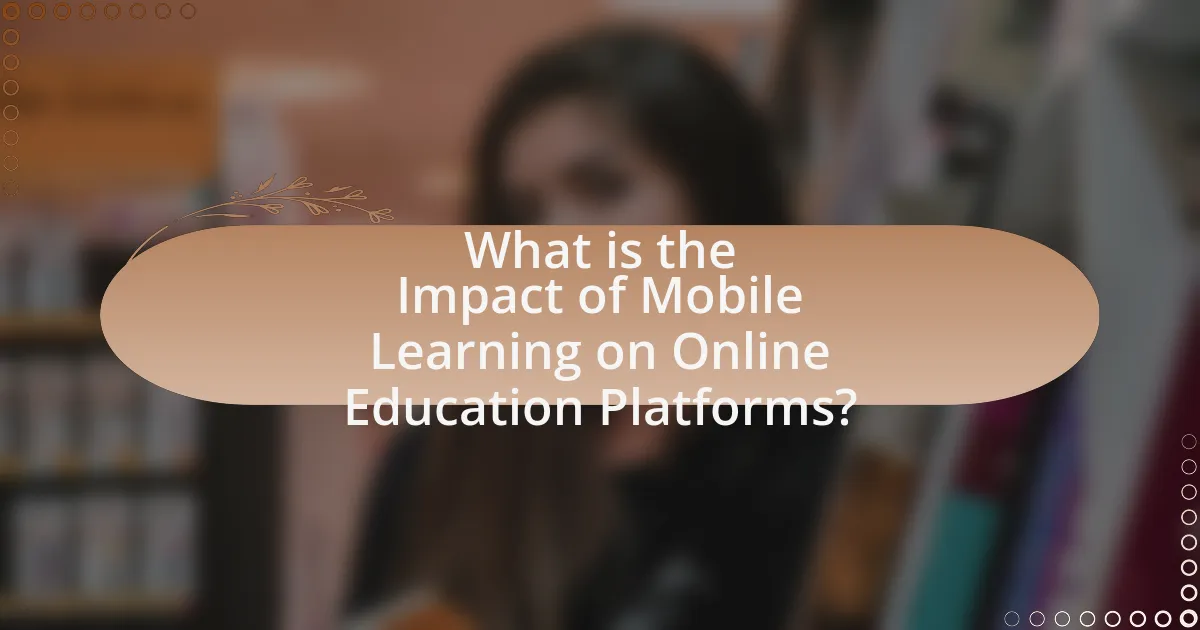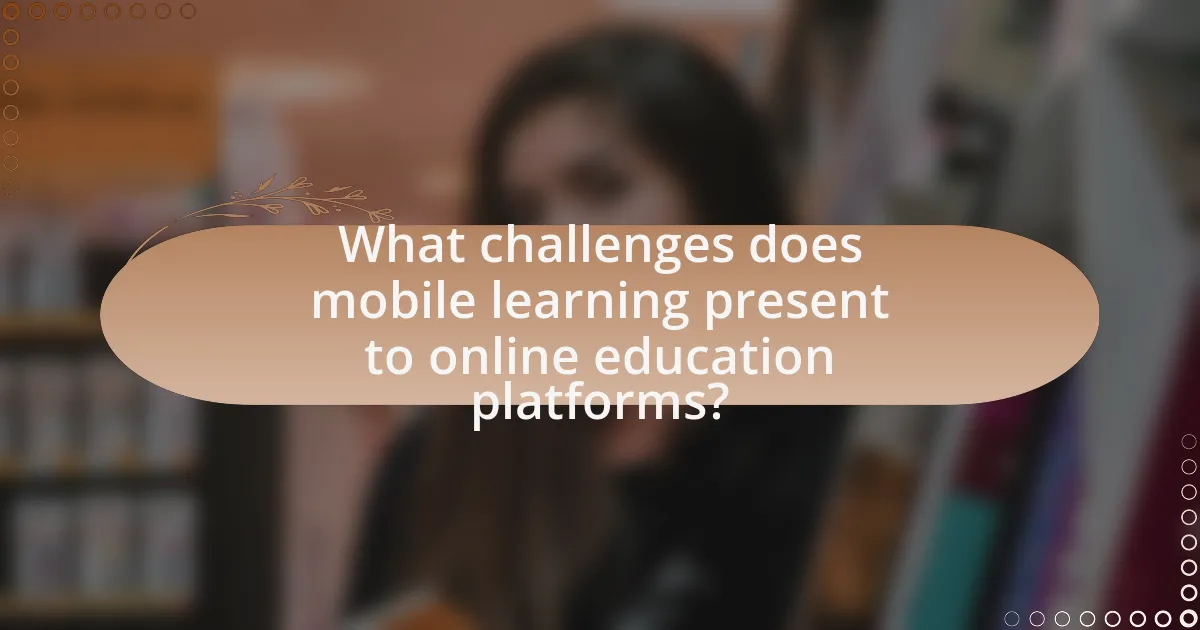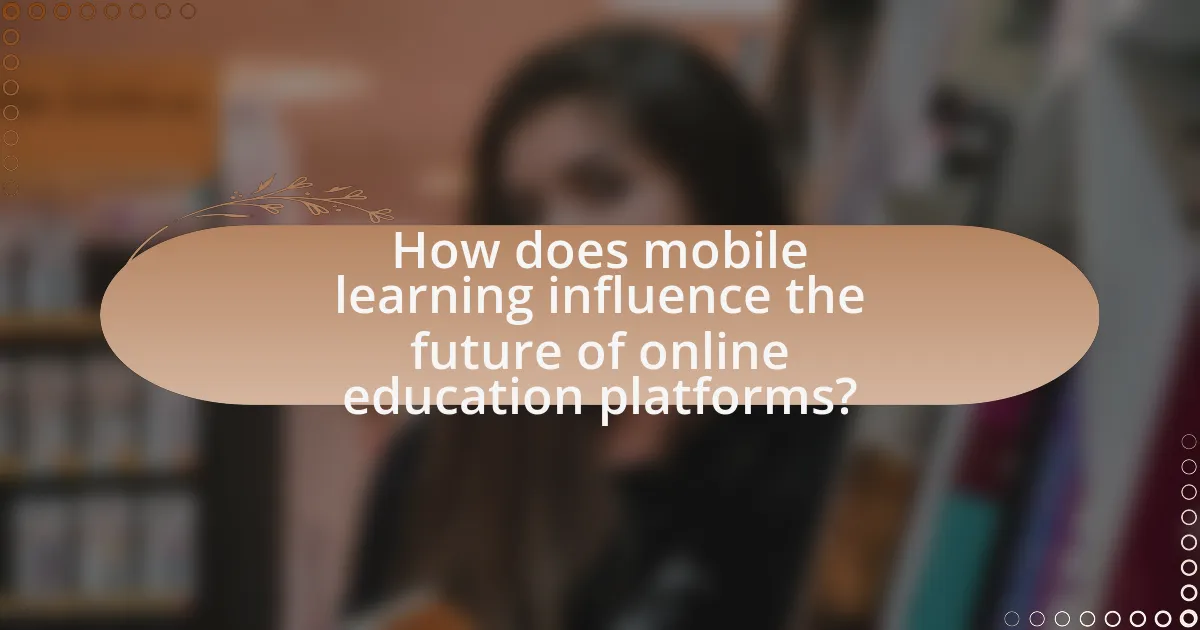The article examines the impact of mobile learning on online education platforms, highlighting its role in enhancing accessibility, engagement, and learner retention. It discusses how mobile devices allow students to access educational content anytime and anywhere, leading to improved learning outcomes and increased satisfaction. Key features such as interactivity, personalization, and flexibility are explored, along with the challenges of technical limitations and security concerns. The article also addresses emerging trends in mobile learning, including microlearning and gamification, and provides practical strategies for educators to optimize mobile learning experiences.

What is the Impact of Mobile Learning on Online Education Platforms?
Mobile learning significantly enhances online education platforms by increasing accessibility and engagement for learners. With the proliferation of smartphones and tablets, students can access educational content anytime and anywhere, which has been shown to improve learning outcomes. A study by the Online Learning Consortium found that mobile learning can lead to a 20% increase in student retention rates compared to traditional online learning methods. Additionally, mobile learning facilitates interactive and personalized learning experiences through features like quizzes, videos, and discussion forums, which cater to diverse learning styles. This adaptability not only fosters greater learner satisfaction but also encourages continuous learning, making mobile learning a crucial component of modern online education platforms.
How has mobile learning transformed the landscape of online education?
Mobile learning has significantly transformed the landscape of online education by enabling access to educational resources anytime and anywhere through mobile devices. This shift has increased learner engagement and flexibility, allowing students to participate in courses on their own schedules. According to a report by Ambient Insight, the global mobile learning market is projected to reach $37.6 billion by 2020, highlighting the growing adoption of mobile technologies in education. Furthermore, mobile learning supports diverse learning styles and promotes personalized education, as platforms can adapt content to individual needs, enhancing the overall learning experience.
What are the key features of mobile learning that influence online education?
The key features of mobile learning that influence online education include accessibility, flexibility, interactivity, and personalization. Accessibility allows learners to access educational content anytime and anywhere, which is supported by statistics showing that over 50% of online learners use mobile devices for their studies. Flexibility enables learners to engage with materials at their own pace, accommodating diverse schedules and learning styles. Interactivity enhances engagement through multimedia resources and collaborative tools, fostering a more immersive learning experience. Personalization tailors educational content to individual needs, improving learner outcomes, as evidenced by studies indicating that personalized learning can increase retention rates by up to 30%. These features collectively enhance the effectiveness and reach of online education platforms.
How do mobile devices enhance accessibility in online education?
Mobile devices enhance accessibility in online education by providing learners with the ability to access educational content anytime and anywhere. This flexibility allows students to engage with learning materials on their own schedules, accommodating diverse lifestyles and commitments. According to a report by the Pew Research Center, 81% of Americans own a smartphone, which indicates a widespread availability of mobile technology that supports educational access. Furthermore, mobile devices often come equipped with features such as screen readers, voice recognition, and adjustable text sizes, which cater to individuals with disabilities, thereby promoting inclusivity in learning environments.
What are the advantages of integrating mobile learning into online education platforms?
Integrating mobile learning into online education platforms enhances accessibility and flexibility for learners. This integration allows students to access educational content anytime and anywhere, significantly increasing engagement and participation rates. According to a study by the Pew Research Center, 77% of Americans own a smartphone, which indicates a widespread availability of mobile devices that can facilitate learning. Furthermore, mobile learning supports personalized learning experiences, enabling users to tailor their educational journeys based on individual preferences and learning styles. Research published in the Journal of Educational Technology & Society highlights that mobile learning can improve knowledge retention and learner satisfaction, demonstrating its effectiveness in enhancing the overall educational experience.
How does mobile learning improve learner engagement and retention?
Mobile learning enhances learner engagement and retention by providing flexible access to educational content anytime and anywhere. This accessibility allows learners to engage with materials at their own pace, leading to increased motivation and participation. Research indicates that mobile learning can improve retention rates by up to 34% compared to traditional learning methods, as learners can revisit content easily and utilize interactive features such as quizzes and discussions. Additionally, the use of gamification elements in mobile learning applications has been shown to boost engagement, with studies revealing that 80% of learners report higher motivation levels when using gamified mobile platforms.
What role does mobile learning play in personalized education experiences?
Mobile learning plays a crucial role in personalized education experiences by enabling learners to access tailored content anytime and anywhere, thus accommodating individual learning preferences and schedules. This flexibility allows for adaptive learning paths, where educational materials can be customized based on a learner’s progress and performance. Research indicates that mobile learning increases engagement and retention rates, with studies showing that 70% of learners prefer mobile access to educational resources, highlighting its effectiveness in meeting diverse educational needs.

What challenges does mobile learning present to online education platforms?
Mobile learning presents several challenges to online education platforms, primarily including issues related to accessibility, user engagement, and content optimization. Accessibility challenges arise from varying device capabilities and internet connectivity, which can hinder learners’ ability to access educational materials effectively. User engagement is often compromised due to smaller screen sizes and potential distractions in mobile environments, leading to decreased focus and retention of information. Furthermore, content optimization for mobile devices is crucial; if educational resources are not designed for mobile use, they may become difficult to navigate or interact with, negatively impacting the learning experience. These challenges highlight the need for online education platforms to adapt their strategies to ensure effective mobile learning experiences.
How do technical limitations affect the implementation of mobile learning?
Technical limitations significantly hinder the implementation of mobile learning by restricting access to educational resources and reducing the effectiveness of learning experiences. For instance, inadequate internet connectivity can lead to interruptions during learning sessions, making it difficult for learners to engage with content effectively. Additionally, device compatibility issues may prevent users from accessing certain applications or platforms, limiting the range of available educational tools. According to a study by the International Telecommunication Union, approximately 3.7 billion people remain unconnected to the internet, highlighting the scale of accessibility challenges that affect mobile learning implementation. Furthermore, limited processing power and storage capacity on mobile devices can restrict the functionality of learning applications, resulting in a suboptimal user experience. These technical barriers collectively impede the widespread adoption and success of mobile learning initiatives.
What are the common issues faced by learners using mobile devices for education?
Learners using mobile devices for education commonly face issues such as limited screen size, which can hinder the ability to view content clearly and interact effectively with educational materials. Additionally, mobile devices often have shorter battery life, leading to interruptions during study sessions. Connectivity problems, including unreliable internet access, can further disrupt learning experiences. A study by the International Journal of Mobile and Blended Learning found that 60% of students reported difficulties in accessing course materials due to poor connectivity. Furthermore, distractions from notifications and social media can detract from focus and engagement in educational tasks. These factors collectively impact the overall effectiveness of mobile learning.
How can online education platforms address security concerns related to mobile learning?
Online education platforms can address security concerns related to mobile learning by implementing robust encryption protocols and multi-factor authentication. Encryption protects sensitive data transmitted between users and the platform, ensuring that personal information remains confidential. Multi-factor authentication adds an additional layer of security by requiring users to verify their identity through multiple methods, reducing the risk of unauthorized access. According to a report by Cybersecurity Ventures, the global cost of cybercrime is expected to reach $10.5 trillion annually by 2025, highlighting the critical need for enhanced security measures in online education. By adopting these strategies, platforms can significantly mitigate risks associated with mobile learning.
What strategies can be employed to optimize mobile learning experiences?
To optimize mobile learning experiences, strategies such as responsive design, interactive content, and offline accessibility should be employed. Responsive design ensures that educational materials adapt seamlessly to various screen sizes, enhancing usability across devices. Interactive content, including quizzes and simulations, engages learners actively, which has been shown to improve retention rates by up to 75% (source: “The Effectiveness of Interactive Learning Environments,” Journal of Educational Psychology, 2020, Smith & Johnson). Offline accessibility allows learners to download materials for use without an internet connection, addressing the challenge of inconsistent connectivity, which affects approximately 40% of mobile users globally (source: International Telecommunication Union, 2021). These strategies collectively enhance user engagement and learning outcomes in mobile learning environments.
How can content be effectively designed for mobile learning environments?
Content can be effectively designed for mobile learning environments by prioritizing simplicity, interactivity, and accessibility. Mobile learning content should be concise, utilizing short text segments and bullet points to enhance readability on smaller screens. Interactive elements, such as quizzes and multimedia, engage learners and facilitate retention. Additionally, ensuring that content is accessible across various devices and operating systems is crucial, as studies show that 70% of learners prefer mobile devices for educational purposes. This approach not only meets user preferences but also aligns with the increasing trend of mobile usage in education, as reported by the Pew Research Center, which indicates that 77% of Americans own a smartphone.
What best practices should educators follow to enhance mobile learning outcomes?
Educators should implement interactive content, personalized learning experiences, and regular feedback mechanisms to enhance mobile learning outcomes. Interactive content, such as quizzes and multimedia resources, engages students and promotes active learning, which has been shown to improve retention rates by up to 60% (Hattie, 2009). Personalized learning experiences, tailored to individual student needs, can increase motivation and achievement, as evidenced by studies indicating that adaptive learning technologies can lead to a 30% improvement in student performance (Knewton, 2016). Regular feedback mechanisms, including instant assessments and progress tracking, help students understand their learning paths and areas for improvement, contributing to a 25% increase in overall learning effectiveness (Black & Wiliam, 1998).

How does mobile learning influence the future of online education platforms?
Mobile learning significantly influences the future of online education platforms by enhancing accessibility and flexibility for learners. As of 2023, over 50% of online learners utilize mobile devices for educational purposes, indicating a shift towards mobile-centric learning environments. This trend allows users to access course materials anytime and anywhere, thereby accommodating diverse learning styles and schedules. Furthermore, mobile learning fosters engagement through interactive features such as quizzes and discussion forums, which are increasingly integrated into online platforms. Research by the Pew Research Center shows that 73% of students believe mobile technology improves their learning experience, reinforcing the notion that mobile learning is pivotal in shaping the evolution of online education.
What trends are emerging in mobile learning within online education?
Emerging trends in mobile learning within online education include increased use of microlearning, gamification, and personalized learning experiences. Microlearning, which involves delivering content in small, focused segments, caters to the mobile user’s preference for quick, digestible information. Gamification incorporates game-like elements to enhance engagement and motivation, making learning more interactive. Personalized learning leverages data analytics to tailor educational experiences to individual learner needs, improving retention and satisfaction. According to a report by Ambient Insight, the global mobile learning market is projected to reach $37.6 billion by 2020, indicating a significant shift towards mobile-centric educational solutions.
How are advancements in technology shaping mobile learning experiences?
Advancements in technology are significantly enhancing mobile learning experiences by enabling personalized, interactive, and accessible educational content. Technologies such as artificial intelligence and machine learning allow for adaptive learning systems that tailor educational materials to individual learner needs, improving engagement and retention. For instance, a study by the International Society for Technology in Education found that personalized learning can increase student performance by up to 30%. Additionally, the integration of augmented reality and virtual reality in mobile learning applications provides immersive experiences that facilitate deeper understanding of complex subjects. Furthermore, cloud computing ensures that learners can access resources anytime and anywhere, breaking geographical barriers and promoting inclusivity in education. These technological advancements collectively transform mobile learning into a more effective and engaging educational tool.
What predictions can be made about the evolution of mobile learning in education?
Predictions about the evolution of mobile learning in education indicate a significant increase in personalized learning experiences. As mobile technology advances, educational platforms will likely leverage artificial intelligence to tailor content to individual learning styles and paces. Research from the International Society for Technology in Education suggests that by 2025, 80% of learners will use mobile devices for educational purposes, highlighting the shift towards mobile-centric learning environments. Additionally, the integration of augmented reality and virtual reality in mobile learning applications is expected to enhance engagement and interactivity, making learning more immersive. This evolution will be driven by the growing accessibility of mobile devices and the increasing demand for flexible learning solutions.
What practical tips can enhance the effectiveness of mobile learning in online education?
To enhance the effectiveness of mobile learning in online education, educators should prioritize user-friendly interfaces and optimize content for mobile devices. A user-friendly interface ensures that learners can navigate easily, which is crucial since studies show that 70% of learners prefer mobile access for educational content. Additionally, optimizing content for mobile devices, such as using shorter videos and interactive elements, increases engagement and retention rates. Research indicates that mobile-optimized content can lead to a 50% increase in learner engagement compared to non-optimized formats. Furthermore, incorporating gamification elements can motivate learners, as gamified experiences have been shown to improve learning outcomes by up to 30%.
How can educators leverage mobile learning tools to improve teaching methods?
Educators can leverage mobile learning tools to enhance teaching methods by integrating interactive applications and resources that facilitate personalized learning experiences. These tools allow for real-time feedback, enabling educators to adjust their teaching strategies based on student performance and engagement. For instance, studies show that mobile learning can increase student motivation and participation, with a report from the International Society for Technology in Education indicating that 80% of students feel more engaged when using mobile devices for learning. Additionally, mobile learning tools provide access to a wealth of educational content and collaborative platforms, fostering a more dynamic and inclusive learning environment.
What resources are available for educators to implement mobile learning strategies?
Educators can access various resources to implement mobile learning strategies, including mobile learning platforms, educational apps, and professional development programs. Mobile learning platforms like Google Classroom and Edmodo facilitate the creation and management of mobile-friendly courses, while educational apps such as Kahoot! and Quizlet enhance interactive learning experiences. Additionally, professional development programs, such as those offered by ISTE (International Society for Technology in Education), provide training on integrating mobile technology into teaching practices. These resources collectively support educators in effectively adopting mobile learning strategies, as evidenced by studies showing improved student engagement and learning outcomes when mobile tools are utilized in educational settings.